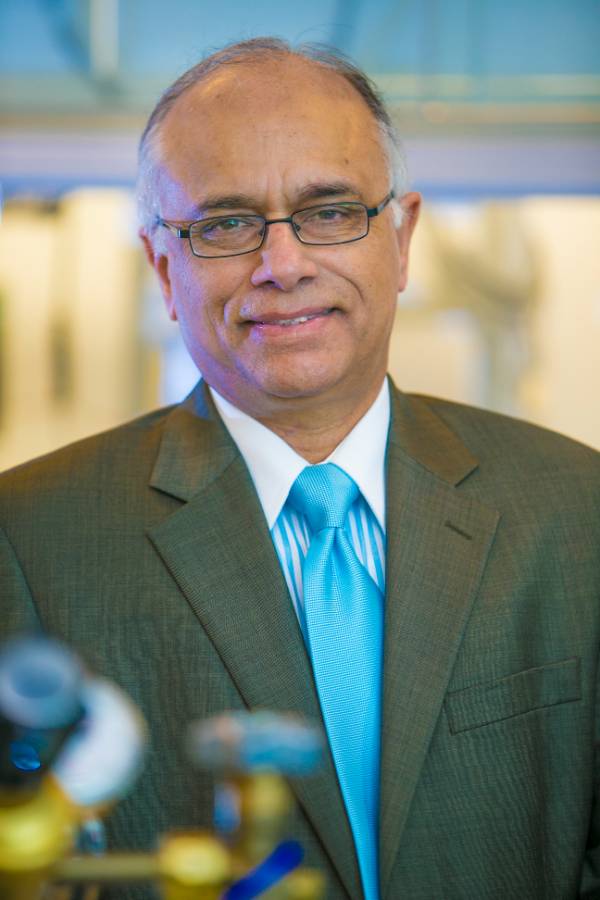Endless summer at the IGIT? Try endless effort.

Devinder Mahajan
Vacation? Not Devinder Mahajan, who has the Advanced Energy Research and Technology Center-based Institute of Gas Innovation and Technology (IGIT) firing on all cylinders this summer.
Proudly trumpeting the “most diverse” student assemblage in the institute’s four-year history, Dr. Mahajan – founding Co-Director of Stony Brook University’s Chemical and Molecular Engineering (CME) program in 2004 after he moved from Brookhaven National Laboratory to Stony Brook, and the IGIT’s founding director in 2018 – counts 27 Seawolves hard at work this season.
The students, including 16 undergraduates, are on a cutting-edge chemical-engineering
odyssey, covering everything from clean-fuel production and ultra-deep hydrosulfurization
to geothermal-energy extractions and Fischer-Tropsch synthesis, combined with modular
process engineering systems – all favorites of Dr. Mahajan, a true champion of low-carbon
energy-tech development and implementation.
The IGIT’s scientific course leads straight to humanity’s most energy-efficient future,
so it’s no surprise the AERTC stalwart would be busy – but even the founding director
is impressed by the institute’s rapid growth, especially through the teeth of the
COVID-19
pandemic.
“The last four years has been very challenging, especially because of the pandemic,” Dr. Mahajan notes. “However, I could not be more pleased with where we are today at the Gas Institute.”
With 11 distinct projects currently in the hopper, the busy professor noted one particular
research area dominating his attention and the IGIT’s resources – the “Hydrogen Economy,
a literal pipe dream wherein clean-burning hydrogen is the nation’s primary commercial
fuel, powering a substantial percentage of utility, transportation, and private services.“There’s
a bigger prize that everybody’s after, and that is [U.S. Department of Energy]’s hydrogen
hubs,” Dr. Mahajan says, referencing $8 billion earmarked in the Infrastructure Investment
and Jobs Act for the development of national “hydrogen hubs."
New York State, naturally, is in the running for one of these hubs, with the New York State Energy Research and Development Authority leading the way and some 50 academic and corporate partners on board – including SBU, which enjoys a substantial running start.
“We started working on these ideas four years ago,” Dr. Mahajan notes. “That means Stony Brook is very well positioned to play a crucial part in this hub.” Moreover, the institute is the only such entity in New York State dedicated to gas research that is crucial to transition to a non-carbon energy future.
Meanwhile, there’s also “a lot of funding showing up” from other state and federal agencies, according to the clean-gen specialist, who reports lots of early-stage positioning in what’s shaping up as an $1 trillion national industry by 2050.
“It’s all hydrogen-focused, and we’re in on that,” Dr. Mahajan adds. “In terms of
our outside collaboration, the work that we are doing is leading to more collaborations
and more funding.
“Everything goes hand-in-hand.”
With the hydrogen economy bubbling, the IGIT director is celebrating a different kind
of victory. The professor, who has served as the Chemical and Molecular Engineering
graduate program director since 2016, worked diligently with the Graduate School to
seek approval from the New York State Department of Education to add a degrees path
to the CME curriculum – turning the four-year bachelor’s program into a five-year
accelerated BE-MS program.
Approved by the state in January after a two-year application process– the new five-year
program is currently recruiting students for the Fall 2022 semester.
When it starts up, it figures to significantly increase already impressive statistics
for SBU’s CME program, which has already generated nearly two dozen master’s degrees
and PhDs since Dr. Mahajan became the Inaugural Graduate Program Director in 2016.
The professor, who earned his PhD in applied chemistry from the University of British
Columbia, is as proud of those numbers as he is excited about the IGIT’s fearless
charge toward a zero-carbon future – even if keeping the institute cooking means he
doesn’t get to enjoy much of a summer vacation.
“We have grown from zero in 2016 to about 30 students now, while graduating 17 master’s
degrees and three PhDs so far,” Dr. Mahajan says. “That’s pretty good, for starting
from zero.”
